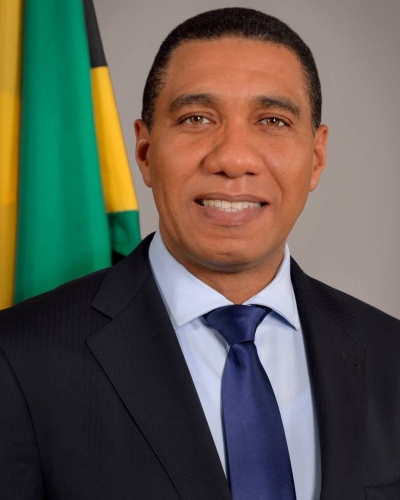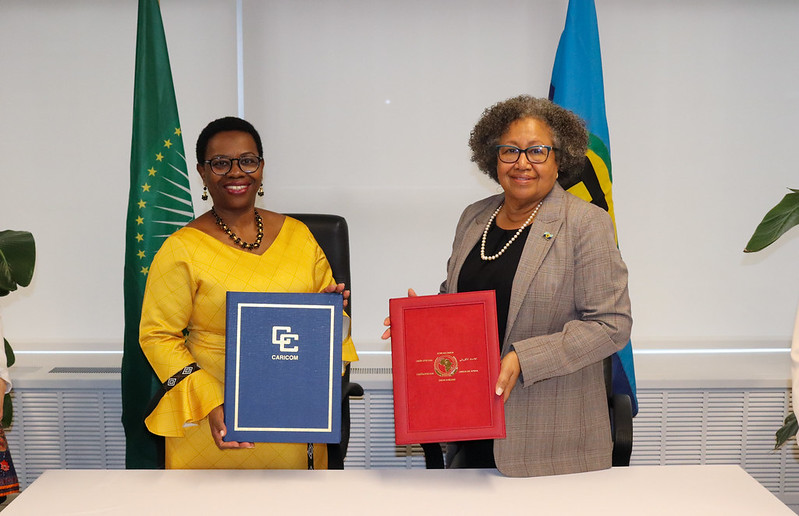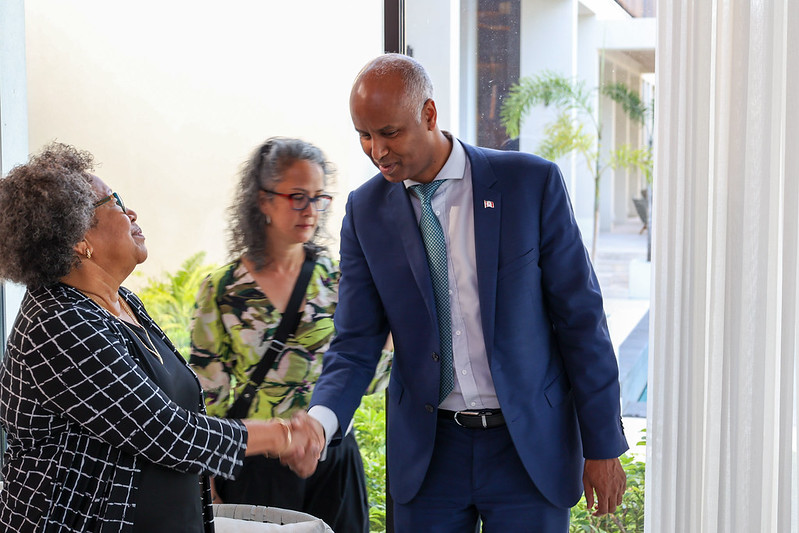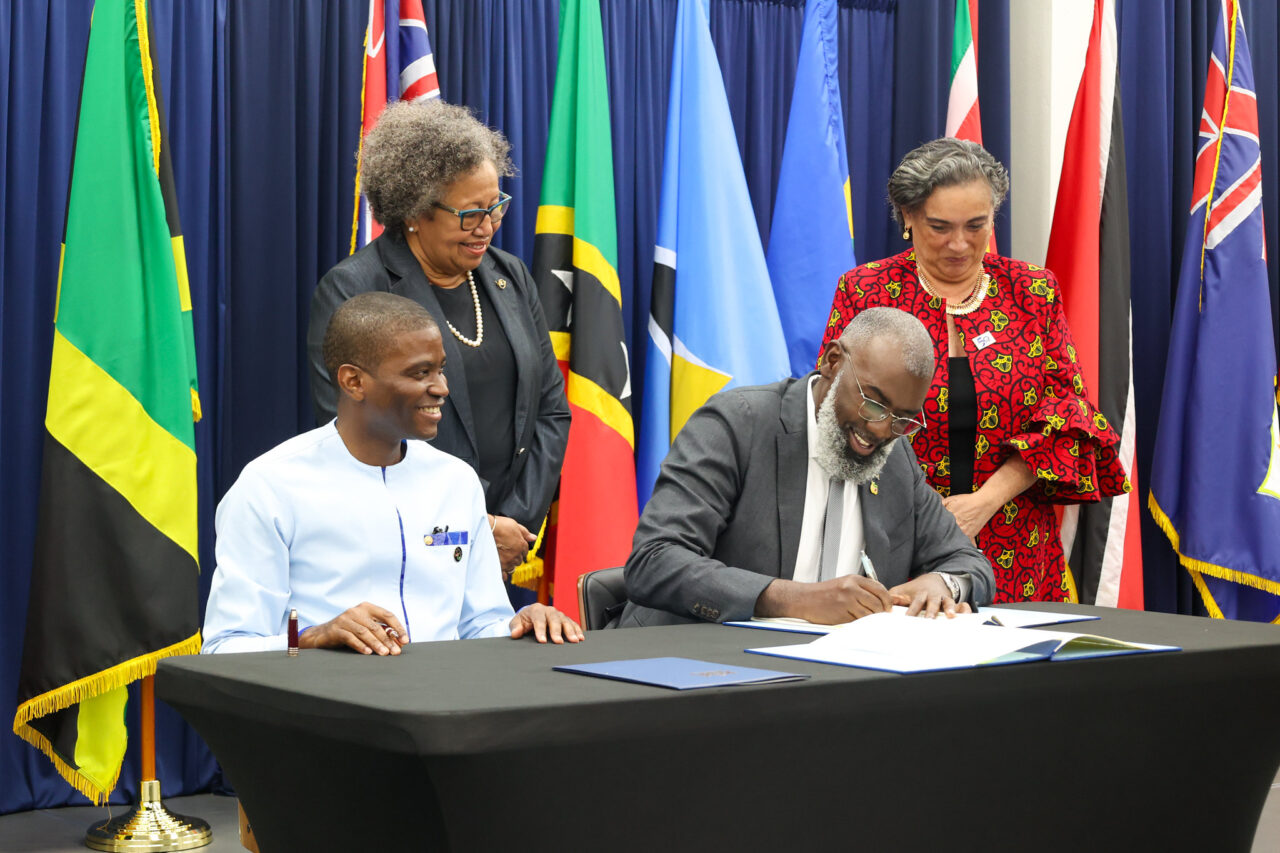External Trade Negotiations
The Caribbean Community, under the guidance of the Prime Ministerial Sub-Committee on External Negotiations, chaired by Jamaica, has been undertaking initiatives to support the efforts of Member States to increase their capacity to earn export revenues through trade with Third States thereby integrating the Community more successfully into the global economy.
Improved Trade Performance
The Community is assessing its trade performance under its existing external trading arrangements with a view to improving the contribution of trade under these arrangements to the Region’s economic resilience and sustainable economic growth and development. These trading arrangements include agreements with the United States, Europe, United Kingdom, Canada, Columbia, Dominican Republic, Costa Rica and Cuba.
The Community is also monitoring closely and assessing the potential impact of significant changes to the trading policies of its major trading partner, the United States, and developing strategic trade policy responses to meet possible challenges and opportunities. Among such strategic responses, in addition to improving existing trade performance, is deepening the Community’s engagement with non-traditional partners in Africa and emerging trade blocs.
Engagement at the Multilateral Level
The Community remains committed to a transparent, rules-based multilateral trading system and is working on the development and articulation of CARICOM Member States’ positions on key trade issues on the agenda of the World Trade Organisation (WTO), including the preparations for the Fourteenth Ministerial Conference (MC14) scheduled to take place from 26 to 29 March 2026 in Cameroon.
The sixteenth quadrennial conference of the United Nations Trade and Development (UNCTAD 16) is scheduled for October 2025 in Vietnam, under the theme “Shaping the future: Driving economic transformation for equitable, inclusive and sustainable development”. Recognising the importance of such transformation for the Region, the Community has also been participating in the development of the outcome documents for UNCTAD 16.
Building Trade Capacity
Consistent with the mandate of Heads of Government for the Community to prioritise co-operation on trade facilitation under its arrangements with bilateral trading partners, the Community is promoting intra-regional co-operation on trade facilitation in the framework of its bilateral relations with Central American countries under the CARICOM-SICA Plan of Action.
The Secretariat also mobilises capacity building support for CARICOM Member States to implement their commitments under the WTO Trade Facilitation Agreement (TFA) through partnerships with international development partners and international agencies, including the World Bank Group, UN Trade and Development (UNCTAD), ITC, and the WTO Trade Facilitation Agreement Facility.
The Community is also building its capacity to engage in external services and investment trade negotiations by developing national inventories of measures that do not align with international trade agreement obligations, collectively referred to as Non-Conforming Measures (NCMs). These address national treatment, most favoured nation (MFN) treatment, and market access performance requirements.
Improved Trade Performance
The Community is assessing its trade performance under its existing external trading arrangements with a view to improving the contribution of trade under these arrangements to the Region’s economic resilience and sustainable economic growth and development. These trading arrangements include agreements with the United States, Europe, United Kingdom, Canada, Columbia, Dominican Republic, Costa Rica and Cuba.
The Community is also monitoring closely and assessing the potential impact of significant changes to the trading policies of its major trading partner, the United States, and developing strategic trade policy responses to meet possible challenges and opportunities. Among such strategic responses, in addition to improving existing trade performance, is deepening the Community’s engagement with non-traditional partners in Africa and emerging trade blocs.
Engagement at the Multilateral Level
The Community remains committed to a transparent, rules-based multilateral trading system and is working on the development and articulation of CARICOM Member States’ positions on key trade issues on the agenda of the World Trade Organisation (WTO), including the preparations for the Fourteenth Ministerial Conference (MC14) scheduled to take place from 26 to 29 March 2026 in Cameroon.
The sixteenth quadrennial conference of the United Nations Trade and Development (UNCTAD 16) is scheduled for October 2025 in Vietnam, under the theme “Shaping the future: Driving economic transformation for equitable, inclusive and sustainable development”. Recognising the importance of such transformation for the Region, the Community has also been participating in the development of the outcome documents for UNCTAD 16.
Building Trade Capacity
Consistent with the mandate of Heads of Government for the Community to prioritise co-operation on trade facilitation under its arrangements with bilateral trading partners, the Community is promoting intra-regional co-operation on trade facilitation in the framework of its bilateral relations with Central American countries under the CARICOM-SICA Plan of Action.
The Secretariat also mobilises capacity building support for CARICOM Member States to implement their commitments under the WTO Trade Facilitation Agreement (TFA) through partnerships with international development partners and international agencies, including the World Bank Group, UN Trade and Development (UNCTAD), ITC, and the WTO Trade Facilitation Agreement Facility.
The Community is also building its capacity to engage in external services and investment trade negotiations by developing national inventories of measures that do not align with international trade agreement obligations, collectively referred to as Non-Conforming Measures (NCMs). These address national treatment, most favoured nation (MFN) treatment, and market access performance requirements.

Dr The Most Honourable Andrew Holness,
Lead Head of Government for External Trade Negotiations in the CARICOM Quasi Cabinet

In the margins of 79th Session of the United Nations General Assembly, CARICOM and the African Union signed a Memorandum of Understanding to enhance cooperation and collaboration. The MoU was signed by the CARICOM Secretary-General, Dr Carla Barnett (L), and the Deputy Chairperson (DCP) of the African Union (AU) Commission, H.E. Dr. Monique Nsanzabaganwa (R), on behalf of the African Union

CARICOM Secretary-General, Dr Carla Barnett (R) greets Minister for International Development of Canada, Hon. Ahmed Hussen during his engagements with CARICOM Heads of Government in the margins of the 47th Conference of Heads of Government.

